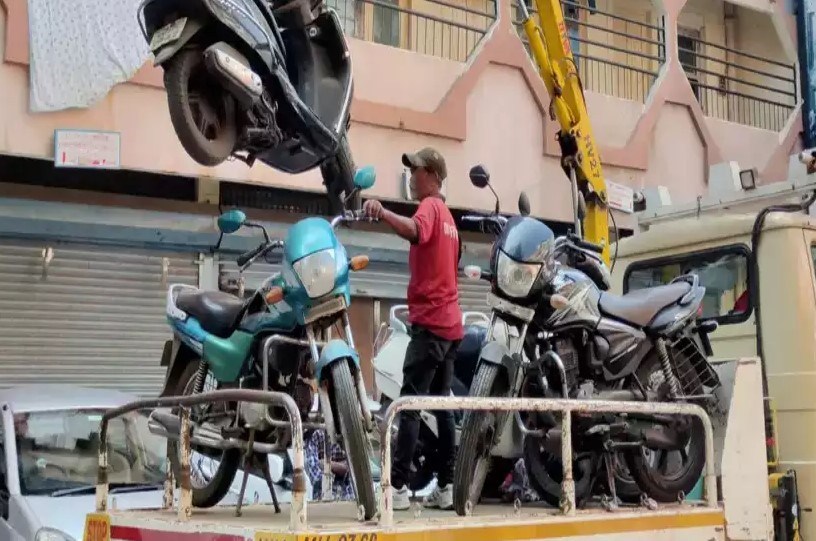Mumbai, India’s financial capital and a city that never sleeps, is as famous for its vibrant spirit as it is infamous for its traffic snarls. With millions of vehicles navigating its roads daily, the role of the Mumbai Traffic Police is undeniably critical. They are tasked with the unenviable job of keeping the city’s chaotic traffic under control. However, increasing allegations of heavy-handed tactics, particularly concerning vehicle towing, have raised questions about fairness, accountability, and the balance between enforcing rules and respecting citizens’ rights.
The Problem: Lack of Clear Signage
The absence of proper signage creates confusion about where parking is allowed. Many residents argue that they inadvertently park their vehicles in spots they believe to be legal, only to find their vehicles missing later. This is especially concerning in areas where no markings or boards explicitly indicate restrictions. Without visible instructions, it becomes nearly impossible for drivers to discern no-parking zones, leading to unintentional violations.
Failure to Inform Vehicle Owners
A major grievance is the alleged lack of communication by the traffic police. In several instances, vehicle owners claim they were not informed about their vehicles being towed. This adds to their distress, as they are left searching for their vehicles, unaware of their location. Often, they discover the situation only after significant time and effort, leading to further delays and frustration.
“Dadagiri” or Enforcement?
A term increasingly echoed by frustrated citizens is “dadagiri,” implying an autocratic and high-handed approach by some traffic personnel. While the intention behind towing—ensuring smoother traffic flow—is understandable, the perceived aggression in execution has sparked widespread resentment. Vehicle owners often complain about the lack of proper communication and the seemingly arbitrary nature of these actions.
Adding fuel to the fire is the financial strain caused by hefty fines and towing charges. Many feel this is less about traffic management and more about revenue generation, further eroding public trust in the system.
Communication Breakdown
A recurring grievance among citizens is the lack of transparency in the towing process. Once a vehicle is towed, owners are rarely informed directly. Instead, they are left to navigate a stressful maze of finding out where their vehicle has been taken, often involving multiple calls or visits to towing yards. For a city as fast-paced as Mumbai, this loss of time can be particularly frustrating.
Impact on Citizens
This pattern of enforcement has several far-reaching consequences:
- Emotional Stress: The sudden disappearance of a vehicle can cause panic, especially in emergencies.
- Financial Burden: The combined cost of fines and towing fees is often exorbitant, placing an unexpected strain on citizens.
- Loss of Trust: Heavy-handed tactics alienate citizens, creating an “us versus them” mentality between the public and the authorities.
- Increased Inconvenience: Without proper notification, retrieving a towed vehicle can become a time-consuming ordeal.
What Needs to Change?
If the Mumbai Traffic Police are to truly serve the public, several reforms are urgently needed:
- Clear and Visible Signage
Every no-parking zone must be clearly marked with prominent boards or road markings, eliminating ambiguity and ensuring citizens are aware of restrictions. - Proactive Communication
The police must adopt transparent practices, such as informing vehicle owners via SMS or apps immediately after towing. - Fair Enforcement
Towing should be reserved for genuine violations that disrupt traffic flow, not for minor infractions in areas without clear restrictions. - Technology Integration
Leveraging technology for real-time updates on towed vehicles, their locations, and the process for retrieval would ease citizen frustration. - Public Awareness Campaigns
A well-informed citizenry is less likely to inadvertently violate parking rules. Regular campaigns can educate the public about designated parking zones and penalties. - Accountability Measures
Establishing a grievance redressal system for wrongful towing incidents would foster trust and ensure accountability among traffic personnel.
Striking the Right Balance
The Mumbai Traffic Police are undoubtedly vital to the city’s functioning, but their approach must evolve with the times. Enforcement without empathy risks alienating the very citizens they are meant to serve. By prioritizing clarity, transparency, and communication, the police can rebuild trust and foster a cooperative relationship with the public.
Mumbai is a city of resilience, and its people deserve a system that respects their time, money, and rights while ensuring smooth traffic flow. Reforming current practices isn’t just a matter of convenience—it’s a step toward a more equitable and citizen-friendly governance model.
The onus now lies on the authorities to demonstrate that they are not merely enforcers of the law but protectors of the public’s interests. Only then can the label of “dadagiri” be replaced with one of respect and reliability.















